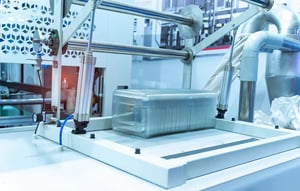
Leading the Packaging Industry’s Future
AJOVER-DARNEL
Ajover-Darnel is a leading petrochemical, construction, and packaging manufacturer with over 40 years of experience. Its products, such as disposable and recyclable plastic food packaging, are renowned for their quality. The company ensures the availability of its products worldwide through its production plants in the United States, Colombia, Brazil, Uruguay, Spain, Turkey, and Israel, and distribution centers on four continents, making it a benchmark in the packaging industry.
Working with London Consulting Group, Ajover-Darnel carried out a project that focused on optimizing its operations and key processes, implementing strategies based on advanced manufacturing techniques and data analysis technology.

STRATEGIC CHALLENGES TO TRANSFORM THE PACKAGING INDUSTRY
In this project, Ajover-Darnel challenged itself to improve its planning, procurement, and floor control processes. The goal was to increase operational efficiency through better coordination between key areas, cost reductions, and process optimization in departments such as maintenance, logistics, and sales, all with a focus on improving the organization’s overall performance.
Optimize communication between the sales forecast and planning, improving forecast accuracy and monthly change management.
Improve inventory levels and optimize raw material coverage, consolidating purchases to obtain better prices.
Establish better production policies, optimize resources, and correct errors in metrics such as OTIF.
Improve quality standards, roles, and centralizing the returned goods.
Implement a maintenance plan that prioritizes the criticality of the equipment and the necessary resources.
Improve inventory control, operator productivity, and warehouse space management.
Formalize commercial strategies that are based on mathematical models and segmentation.
Reorganize the organizational structure and update job descriptions to improve efficiency.
Foster a result-oriented management culture that embraces changes, improving collaboration between levels.
CLEAR GOALS TO MAXIMIZE EFFICIENCY AND SUSTAINABLE GROWTH
Ajover-Darnel, in collaboration with London Consulting Group, established a series of key objectives to improve its operational efficiency. This joint effort focused on improving the organization’s planning and supply processes, optimizing production, and improving maintenance and quality. Initiatives were also implemented to increase inventory reliability and develop leaders that promote a culture of continuous improvement, ensuring the operation’s continuous and sustainable growth.
Improve forecast accuracy, reduce out-of-stock and slow-moving products, and increase cycle count compliance.
Optimize inventories, improve service levels, and reduce lead times when developing procurement plans.
Increase equipment efficiency and production, improve OTIF, and reduce production costs.
Increase compliance with the quality plan, reducing claims, returned goods, and NCMR (Non-Conforming Material Register).
Increase equipment availability, preventive maintenance, and service level.
Improve OTIF, reduce freight costs, returned goods, and breakdowns, and increase productivity and inventory reliability.
Comply with the budgets, increase portfolio penetration and the number of active clients, and improve operational management.
Optimize the organizational structure and capitalize on efficiencies.
Develop leaders, improve front-line coaching, and positively impact the work culture.

DRIVING TRANSFORMATION WITH OPTIMIZED PROCESSES AND TANGIBLE RESULTS
London Consulting Group worked with the company to implement improvements in key areas such as planning, procurement, floor control, quality, maintenance, logistics, sales, and human development. Specific actions were carried out, from optimizing forecasts and inventory controls to standardizing processes and developing analysis tools. These changes enabled the organization to achieve greater operational efficiency and positively impacted the results.
- 01 Planning
- 02 Supply
- 03 Floor Control
- 04 Quality
- 05 Maintenance
- 06 Logistics
- 07 Sales
- 08 Structure
- 09 Human Development
Planning
- Demand forecasting: Improved forecasts focused on soft demand and adjustments made according to demand.
- S&OP: Implementing the sales and constrained S&OP, which included updating the objectives and fine-tuning.
- Portfolio Management: Designing a methodology and a portfolio analysis tool.
- Master Plan and Production Schedule: Defining the criteria used to prioritize and control changes in the schedule.
- Out-of-Stock and SM Analysis: Tracking out-of-stock products, classifying the causes, and managing slow-moving FG.
- Indicators: Creating dashboards and conducting WOM (Weekly Operational Meeting), WPM (Weekly Progress Meeting), and COPAC (Corrective Action Plan Committee) meetings.
Supply
- Consumption period analysis: Defining the total and average consumption using optimal lead times.
- Min - ROP - Max calculation: Establishing optimal inventory levels to deliver orders on time.
- Calculating the PO issuance: Optimizing inventories according to the correct dates.
- LOAs (List of Activities) Analysis: Improving activity distribution and efficiency.
- Profiles and roles: Creating profiles for Category Managers and procurements.
- Structures: Proposing structures and key positions.
- Data analysis: Spending by categories and suppliers.
- Determining categories: Categorizing the materials and services.
- Strategic models: Developing models focused on strategy.
Floor Control
- Scheduling: Daily prioritization with control over product changes and Capacity Plan and Flexibility Matrix tools.
- Work assignment: Implementing shift checklists and updating the objectives.
- Daily supervision: Checklists to monitor indicators and control key variables.
- Standards: Updating the equipment’s velocity standards and designing new operating standards.
- Daily production: Managing scheduled stoppages and analyzing the impact.
- Management Model: Automated control panels and implementing DM, WOM, WPM, and COPAC.
Quality
- Scheduling: Designing a model that guarantees the execution of the schedules and methodology plans and ensures that they align with the department's strategy.
- Work assignment: Implementing daily tasks and activity checklists for the coordinators and quality analysts.
- Daily supervision: Implementing tools to control and follow up on the quality plan.
- Standards: Designing inspection routines that align with the production.
- Execution: Standardizing registration and measurement formats.
- Management Model: Automated control panels and COPAC.
Maintenance
- Scheduling: Implementing a tool that takes into account capacity and resource availability in maintenance and production.
- Work Assignment: Creating a Flexibility Matrix to optimize critical equipment interventions.
- Daily supervision: Designing daily tasks for supervisors with a focus on efficiency and maintenance control.
- Standards: Tool to calculate ROP based on failure risk and spare parts.
- Execution: New maintenance plans for critical equipment.
- Management Model: Automated dashboards and management tools (DM, WOM, WPM, COPAC).
Logistics
- Inventories: Modifying the warehouse layout, redesigning the Cyclic Counts, and standardizing inventory locations.
- Picking: Defining productivity metrics, incentives, and random audits. Piloting a new Cage system in Madrid.
- Vehicle loading: Pre-invocing enabled in 22 vehicles.
- Cleaning and optimization: Integrating cleaning routines and optimizing the forklift routes.
- Separation of functions: Division between Loading and Warehouse Tasks.
- Modules and KPIs: Implementing pre-invoicing, KPIs dashboard in BI, WPM, and WOM.
Sales
- Planning and Segmentation: Customers were segmented using margins and LISIM classification, and simulations were developed to measure sales potential.
- Sales Force: Calculating and measuring the capacity required by zones and controlling the visiting plan.
- Customer Service: Defining the sales process and visit preparations.
- Active Selling: Creating tools in Power Apps to improve suggested orders and cross-selling.
- Active Supervision: Implementing daily tasks and daily supervision routines.
- Indicators: Developing dashboards in Excel and Power BI.
Structure
- Operations: Implementing automatic registration of Standard Scrap in plants.
- Cartagena Logistics: Capturing loyalty impacts in travel scheduling/negotiation.
- Free Trade Zone: Automating the annexes in the FFMM.
- Sales: Automating the reports in large supermarkets.
- Finance BRA (Brazil) /URU (Uruguay): Optimizing in URU to avoid unnecessary retentions and automating tickets in BRA.
- Human Resources BRA/URU: Eliminating manual steps in URU and automating accounting processes in BRA.
- Quality: Eliminating reworks in the KPIs’ consolidation process in BRA.
- Sales: Optimizing shelf presentations in URU.
- BRA/URU Logistics: Creating the OC INTERCO from a flat file in BRA.
Human Development
- Management Skills: We carried out 58 hours of individual coaching, developed 57 action plans, and proposed improvements in the Project Fair, aligned with the new methodology.
- Operational Skills: 67 hours of individual coaching were provided, resulting in the development of 124 action plans to improve operational skills.
MAXIMIZING EFFICIENCY AT EVERY STAGE OF PACKAGING MANUFACTURE
The project positively impacted several key areas of the operation, increasing production efficiency and schedule compliance and reducing costs throughout the operating chain. These improvements not only optimized resources but also increased control over the maintenance, logistics, and quality departments and improved their performance.
- Production: 13% increase in OEE of foamed products, 43% in the rigid products’ OTIF, and 23% increase in compliance with the production schedule, achieving an 89% level of efficiency.
- Quality: 41% reduction in rigid SCRAP, 80% reduction in nonconforming material, and 71% reduction in quality-related claims.
- Maintenance: 91% compliance with the maintenance schedule, 60% reduction in affected availability, and 30% increase in OTIF.
- Planning: OTIF increased to 100%, 47% improvement in forecast accuracy, and 51% reduction in slow-moving products.
- Logistics: 15% increase in inventory reliability and dispatchers’ productivity, and 98% reduction in returned goods.
- Sales: 22% increase in sales and 13% increase in active clients, along with a 50% improvement in coaching skills.
- Organizational Restructuring: 18% reduction in personnel by eliminating unproductive tasks and reworks, along with an 18% increase in the workload distribution among the remaining team.
- Procurement: 41% increase in the OTIF for spare parts and packaging procurements, 72% reduction in stock-outs without purchase orders, and an 83% decrease in procurement lag time, from 12 to 2 days.
These results demonstrate the successful implementation of strategies that focused on improving productivity, reducing response times, and optimizing resource management, enabling the company to transform its operations comprehensively.

OPINIONS THAT REFLECT OUR IMPACT
"The results we obtained far exceeded what I expected at the beginning, the benefits that we’ve achieved have been enormous. Now we operate in a simpler, more efficient and, above all, much more effective way, eliminating complexity in the operation and fostering teamwork."
-President and Shareholder of Ajover Darnel
BOOSTING THE FUTURE OF YOUR STEEL INDUSTRY OPERATIONS
Find out how London Consulting Group can help you transform your processes, optimize your operations and achieve new levels of efficiency. Contact us today and take your business to the next level, fill out the form and receive your free study!

